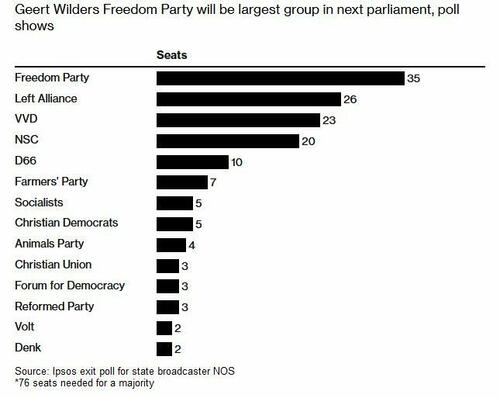Another nationalist populist candidate wins election in landslide and will become Netherland’s prime minister.
The polls were right! Dutch lawmaker Geert Wilders’ and his Freedom Party scored a marked victory in today’s Dutch elections, in which they are projected to win 35 seats, making them the largest group in parliament, Bloomberg reports (only with the ‘FaR RiGhT HiTleRy EviLdOeRz’ branding the MSM ascribes to anyone left of Mao).
35!!!!!!
PVV GROOTSTE PARTIJ ❤️ pic.twitter.com/oMANVYvGjy
— Geert Wilders (@geertwilderspvv) November 22, 2023
And assuming the exit-polls hold up, Wilders’ prospects for forging a coalition government will hinge on his ability to reach across the aisle to parties which have already signaled maximum virtue and vowed never to work with him.
Wilders and his team hugged and cheered as the result was announced and sang along to the Rocky theme tune ‘Eye of the Tiger.’ Reporters who watched his campaign team celebrate at a crowded bar in Scheveningen near The Hague did so from behind glass.
The controversial politician benefited from the vacuum created by outgoing premier Mark Rutte’s decision to quit politics after 13 years in office — and from the refusal of Rutte’s successor as party leader, Dilan Yesilgoz-Zegerius, to rule out working with his party. Anti-migration sentiment of the kind Wilders has long-championed was a prominent issue on the campaign trail. -Bloomberg
In second place was the Left Alliance, headed by Franz Timmermans, who will likely score 26 seats, followed by VVC, which will likely receive 23 seats.

Wilders has served in parliament for 25 years.
* * *
Authored by Thomas Brooke via Remix News,
A shock new poll saw Wilders’ Party for Freedom (PVV) enjoy a dramatic rise in support to put it on equal footing with the governing VVD…
Geert Wilders’ Party for Freedom (PVV) has experienced a dramatic rise in popularity among Dutch voters in a matter of days, rising from fourth place to now polling joint top with the governing VVD after an impressive performance in the latest television debate.
In the most recent survey conducted by pollster MDH, the right-wing populist party strengthened its electoral position by five percentage points to reach 26 percent, on par with the party of outgoing Prime Minister Mark Rutte, now led by Turkish-born Justice Minister Dilan Yeşilgöz-Zegerius.
The increase in support appears to be at the expense of Pieter Omtzigt’s New Social Contract, the centrist party fighting its first national election, whose party’s popularity dropped by the same margin.
“The past week has seen the biggest changes in polling of this campaign. This directly relates to the fact that Geert Wilders was only involved in a debate on television for the first time on Nov. 12,” pollster Maurice de Hond explained.
The Dutch mainstream media has been accused of bias concerning the exposure it gives the more establishment parties in the country in comparison to those advocating a conservative, nationalist approach, particularly regarding immigration.
SBS debat werd de gamechanger. PVV+5 en NSC -5. VVD en PVV nu samen aan kop.
Toch nog veel kiezers die kunnen verschuiven. Lees de analyse.https://t.co/TLfma5K7P5 pic.twitter.com/SQVo1ptW9K— Maurice de Hond (@mauricedehond) November 18, 2023
Earlier this week, data published by a diversity watchdog revealed that no politician from Wilders’ PVV or Thierry Baudet’s Forum for Democracy (FvD) has featured on the leading late-night talk show, Op1, since the fall of the Dutch government back in July, while mainstream parties seemingly deemed to be more palatable by producers, have been invited on dozens of times during the election period.
The SBS debate this week, of which de Hond says “Wilders clearly appeared to be the winner,” seems to have drastically shifted the odds in favor of Wilders’ party being a part of the next Dutch government, or at the very least having a considerable influence on the composition of any coalition government.
“In the penultimate poll, conducted five days before the elections among almost 7,000 respondents, we see this drastic shift: PVV increases by five seats and NSC decreases by five seats. That is a reinforcement of last week’s trend,” the pollster added.
In the last two weeks, the PVV has increased its estimated vote share by seven percentage points, while NSC has seen its support plummet by the same figure to its lowest recorded level since its recent formation. Support for the governing VVD has remained broadly consistent.
Dutch voters head to the polls on Nov. 22 to elect a new government after Mark Rutte’s coalition government collapsed primarily over disagreements relating to asylum and immigration policy.
The election falls under a backdrop of an asylum crisis that is rapidly getting out of control, evidenced by new figures from the Immigration and Naturalization Service (IND) this week which revealed that over 42,000 asylum seekers resident in the Netherlands are awaiting a decision on their asylum application, and the average waiting time for applications to be processed has exceeded a year.
…